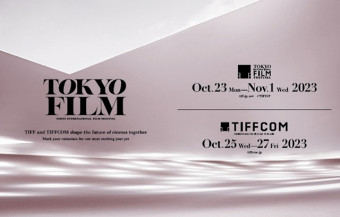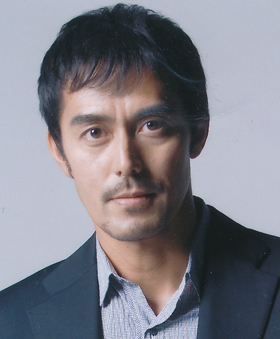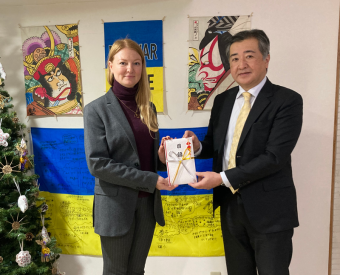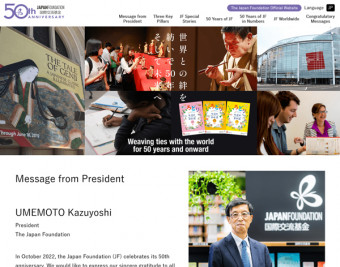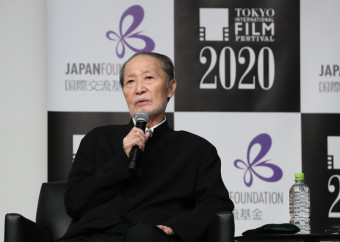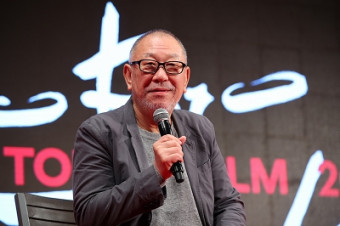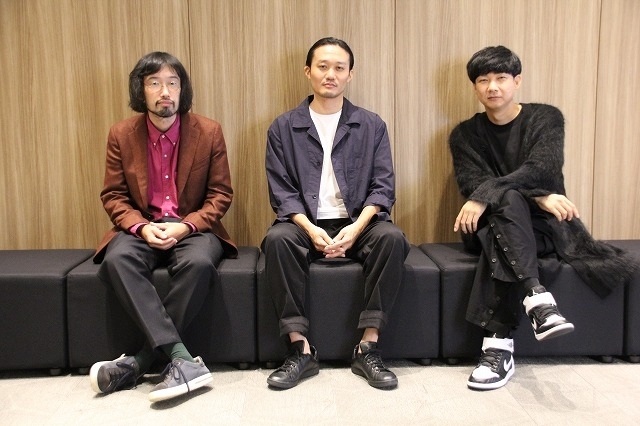
Originally written in Japanese.
Three Japanese films have been selected for the competition section of the 35th Tokyo International Film Festival (TIFF). Those are by the window directed by Imaizumi Rikiya, Mountain Woman directed by Fukunaga Takeshi, and Egoist directed by Matsunaga Daishi. At the lineup announcement press conference held on September 21st, the directors expressed their thoughts on TIFF and their films. We asked them to discuss their thoughts in dialogue style prior to the opening of TIFF.
Asking director Imaizumi, “What is your impression of TIFF so far?”
The first topic was about TIFF to date. TIFF is really a familiar place for director Imaizumi, who participated in the Japanese Cinema Splash with Sad Tea, Their Distance, Same Old, Same Old, and also having got selected in the 31st competition with Just Only Love.
Imaizumi: From the time when I was not able to participate in overseas film festivals, TIFF has given me the opportunity to have my films screened with foreign films and be seen by many audiences, so I feel that I have had a good experience, including meeting former programming director Yatabe Yoshihiko. On the other hand, there were times I seriously wondered where TIFF stands in Asian film festivals scene. I think it is one of the issues that what kind of the position TIFF should take even from the view point of those who actually participate in the festival.
Brillante Mendoza, who was the president jury back then, once said “The programmer explained that it had to be both artistic and commercial and that it had to be understandable to a general audiences, but I don’t think you can combine the two.” He also commended on Just Only Love, which was selected in competition, “It is commercial and easy for the audience to relate to, but I don’t think that should be in competition.”
Imaizumi: Of course, there were some people who appreciated it, so director Mendoza’s opinion was not everything. However, it made me think about a lot of things. There are complicated aspects that can’t just be put away by the simple pleasure of being selected for the competition. The film selected this time (by the window) is an original film about a love story same as Just Only Love, so I am calmly looking at the situation and how people will watch it.
Director Fukunaga , who participated in TIFF for the first time, “The colors of TIFF was hard to see”
Director Fukunaga, known for Out of My Hand and Ainu Mosir, was participating in TIFF for the first time. As a filmmaker and audience, he was unfamiliar with the festival and said, “My impression from the outside was that it was the biggest film event (in the Japanese film industry.) As director Imaizumi mentioned, I felt that there was a lack of clarity in terms of the direction of the festival.”
Fukunaga has been curious about the former Special Screenings section, which had a strong promotional element of films to be released in Japan. Ichiyama Shozo, who became a programming director since 34th edition, and has changed the section name to the Gala Selection. He has decided to eliminate the showcase aspects of the program.
Fukunaga: I thought it (former section) might not be good because it made difficult to see the TIFF colors. Now that Mr. Ichiyama has taken the lead, I think it is very good that this element has been diminished. Looking at the lineup this time, I have the impression that the emphasis is on Asia. In that sense, too, I get the feeling that TIFF is taking a step in to a new direction.”
Towards the place people want to aim at. Film festival’s role director Matsunaga expects.
Director Matsunaga was selected for the competition section for the first time after his participation in “Asian Three-Fold Mirror 2018: Journey,” a co-production by the Japan Foundation Asia Center and the Tokyo International Film Festival.
Matsunaga: My impression of TIFF when I was here as an audience was that it was very hard to get tickets. (laughter) I was trying to get tickets of the films in World Focus section. On the other hand, I think the festival didn’t promote well in guiding people to watch films in the Asian Future section etc., which should be seen by a great number of audiences.
TIFF is the biggest film festival in Japan. That is why “if you are a Korean director, you want to aim for the Busan International Film Festival first. In the same way, it would be ideal for TIFF to be a place that young Japanese people would aim for first,” director Matsunaga commented.
Matsunaga: If you are a filmmaker, you would want to go to Cannes, Berlin, or Venice. However, it is hard to be selected for foreign film festivals skipping film festivals in Japan. I think it’s good to step up along with your career. That is why I hope that TIFF will be the place where Japanese filmmakers will want to present their works. It’s an opportunity to have so many people come and see our work.
Film festival from the perspective of “a place for communication”
This year’s competition section was for feature films completed after January, 2022, and examining 1,695 films from 107 countries and regions. Julie Taymor, director of theater, opera, and film, serves as the president of the jury along with fellow jurors actor Shim Eun-kyung, director João Pedro Rodrigues, director of photography Yanagijima Katsumi, and former director of Institut Français, Marie-Christine de Navacelle. They will judge all 15 films selected for the Competition section.
Fukunaga is looking forward to “communicate” with the directors who will be visiting Japan. “The competition is face of the festival, so I am thinking to watch the films selected for the competition in order to get to know the festival. In addition, I may be able to meet the filmmakers who come to Japan, which is a wonderful treat for me for making the film. This is one of the good things about film festivals.”
We asked Imaizumi and Matsunaga to discuss about TIFF from the perspective of “communication” too.
Imaizumi: The directors I met in the Japanese Cinema Splash section was like a rivals in a way. Thanks to them, I was able to make my next works. I have met many people like that. In particular, when director Watanabe Hirobumi won the Japanese Film Splash Best Film Award for Poolsideman, I was probably the one who got pleased the most. On the other hand, I felt kind of frustrated when director Fukada Koji, who is of the same generation as me, was the jury. I was inspired in a good way.
Matsunaga: I had a good encounter with director Edwin, whom I met through Asian Three-Fold Mirror project. I make films living in Japan, but sometimes I would like to work on casting, crews, and financing outside of Japan. For example, I would like to communicate with directors I meet through competition section, such as “If I go to your country, I would like you to support me, and in exchange, I will cooperate with you if you shoot the film in Japan.” I believe that participating in a film festival is not the end, but rather a `process’.”
Fukunaga: I have a personal opinion about the way film festivals are treated in Japan in terms of promotion. The fact that a film has been selected for a film festival is used as a “stamp” for the film to gain distribution momentum in Japan. I have an impression that this is the biggest purpose of the festival. I believe that film festivals should be a place where filmmakers can interact with each other, bring back the experiences from the festival, and connect them to the next one. It is also a place to celebrate and share various things to promote film culture.
Imaizumi: Actually, I can’t speak English, so I thought it might be helpful to have a translator beside me. If I asked, they might help me, but I have never really asked them to do so. It is a place where I can “communicate” with people, but I was losing a lot of opportunities. Of course, it would be the best if I could speak English myself…When I went to film festivals overseas, there were many times that I felt disappointed and thought, “It would be a waste not to be able to talk with that person at this time.”
The biggest film festival in Japan means it relates deeply with the image of the recent Japanese film industry
Matsunaga further explains about why he said that the film festival is a “process.”
Matsunaga: The film festivals are also a market place. It seems that Japanese producers still lack the consciousness of “selling the film to overseas.” We spend our lives making films. Film festivals take a role as a place to present our films, and also play a big part in the “lives after that” of the people involved in the film. Some might say, “It’s too heavy to impose (film festivals) that much,” but I think that’s the way it should be. Without making changes step by step, the state of Japanese films and TIFF will not change. I feel that I am finally in a position to say this now that my film is in the Competition. As a Japanese director, how I should face to the biggest film festival in this country… I believe that I have a responsibility (to do so.)
Imaizumi: What director Fukunaga talked about “stamps” is also an aspect of the fact that Japanese films are too focusing on the national market. If the filmmakers, promoters and distributors are only conscious of “completing in Japan,” then it will never go beyond. Of course, we should not overconfidently or excessively value films, and we should judge them calmly. However, there have been many examples at TIFF in the past where films selected for the competition and other sections have been seen by people from various countries and have gone out to the international scenes. The results may differ depending on whether or not the people involved in the film are thinking about how to expand the film.
Fukunaga: Film festivals are a place to convey a variety of information and to promote a deeper understanding of film culture as a whole. I think there are many benefits to be gained by having Japan’s largest film festival become a model for other film festivals. Besides, it (TIFF) would have a direct impact on the impression of the current Japanese film industry visitors from abroad might have thinking “This is what Japan’s largest film event is.” This image is deeply connected to the impression of the current Japanese film industry. In this sense, it may be important to look outward rather than only inward.
How should promotion and media be? “We need to change our mindset at each of our positions.”
The directors’ discussion also expanded into how promotion of the films and media should be.
Matsunaga: I have the impression that promotion in Japan is like a conveyor belt which is decided saying “This is the kind of movie, so let’s advertise it this way.” I think this needs to change as well. Creators are told that their expressions and perceptions need to change with the times, and while being imposed with various things, they are making films through trial and error. And then, once the film is completed, (we realize) the method of screening the films in a theater have not changed at all to a terrible degree. I think this point is also deeply related to the way film festivals are held. I try to give my opinion on promotion as much as possible, but even we as a director have our limits. We all need to change our awareness in each position of how those who are involved in promotion should use TIFF in a positive way.
Imaizumi: This may sound a big topic, but this goes back to the question of “how the Japanese film industry and mass media today view films.” The commercial and box office aspects are, of course, something that cannot be ignored. However, the overwhelming number of films are truly inward-looking. We are often asked to make (films) easy to watch and well-paced. The way a film is presented can change depending on how people who are involved in producing it feel about it. For example, this is also connected to the question, “Do films which won awards at the three major film festivals success in winning a big market?
Matsunaga: In the Japanese box office, it is not always the case that “good films would be a hit,” and even films that received high acclaim at Cannes, Berlin or Venice are not necessarily seen in Japan. On the other hand, it is not true that “the three major film festivals are all that matters. ” The Japanese market is very unique. That is why it is important to find a way to promote it well. Also, there was a scene at the press conference that had me tilting my head. There were fewer questions than I thought there would be, right?
Imaizumi: That was a rare situation at film festivals overseas.
Matsunaga: At foreign film festivals, we usually get a lots of questions until just before the end time. It is partly inevitable that there was not enough information in advance. But if I were a journalist specializing in film, I would ask about the director’s approach taken for the new film, referring to the past films. I would like you to be actively involved to have people interested in various aspects of the selected films and the festival itself.
Fukunaga: I have a feeling for the film festival to be a place that eliminates the parts which may seem “wrong” from the director’s point of view as much as possible. For example, the variety show-like talk at the stage greeting. There are many cases in which we cannot talk about the film itself at all. Even websites dedicated to films sometimes emphasize on the topics that have nothing to do with the film itself. I believe that if a film festival can provide a “good model” in various aspects, it will have a positive impact on the film industry as a whole.
Imaizumi: In the first place, the press members seem not interested in films. Or perhaps they are interested, but there is an environment which makes it difficult to express, and often they cover only stories about the actors and such. This is also the creators’ responsibility, but I sincerely want to change the position and status of films in Japan, and I want people to help us do that.
Future of TIFF, we haven’t given up on Japanese films yet
Through this discussion, director Matsunaga seems to be convinced that, although the types of films three directors work on are different, they share the same passion for Japanese films.
Matsunaga: Through our talk this time, I could feel that all of us ” are not giving up” on Japanese films yet. “Matsunaga, it can’t be helped, That’s the way Japanese movies are.” I had heard such sad words from the older generations. It is not hard to imagine that after many years of frustration and struggle, they get exhausted. That may be the way of living. But the three of us here today have not given up. I want to continue saying like “ It should be little more like this,” not only about my own films, but also about Japanese films. It is quite difficult “sending the words” though.
Imaizumi: Words could do come back to us.
Matsunaga: That’s right. If I tried to say something, I would be told, “Well, what about you? Make an interesting film yourself.” But the fact that “people who have not given up” are selected for the competition could be one of the signs that TIFF is changing. Mr. Imaizumi and Mr. Fukunaga must have a lot more to say. I feel that such people are one of the hopes.
Imaizumi: I think it could be a great change that directors like Mr. Matsunaga and Mr. Fukunaga, who have their minds set on overseas markets, are selected for the competition. I am moved that I could hear many things that I had been thinking but had not been able to put into words.
Matsunaga: Some people may think that the level of TIFF is “low” compared to other major film festivals overseas. However, speaking of the Competition section, Japanese films have won the Grand Prix only twice. The first was Typhoon Club directed by Somai Shinji in the 1st edition, and the second was What the Snow Brings directed by Negishi Kichitaro in the 18th edition The results are quite realistic. That is why, one of the elements which will change TIFF is that Japanese films participate with the mindset of winning awards seriously. I think this awareness is quite necessary. With this premise, we will compete with other countries for the main awards. If we can do that, perhaps the way the film festival is viewed will change as well. The jury members are mainly from overseas, and they don’t take account of any kind. They will watch the films equally regardless of where it is from, either Japan or overseas. I hope that films will be seen as competing with each other in the “good quality” category.



















